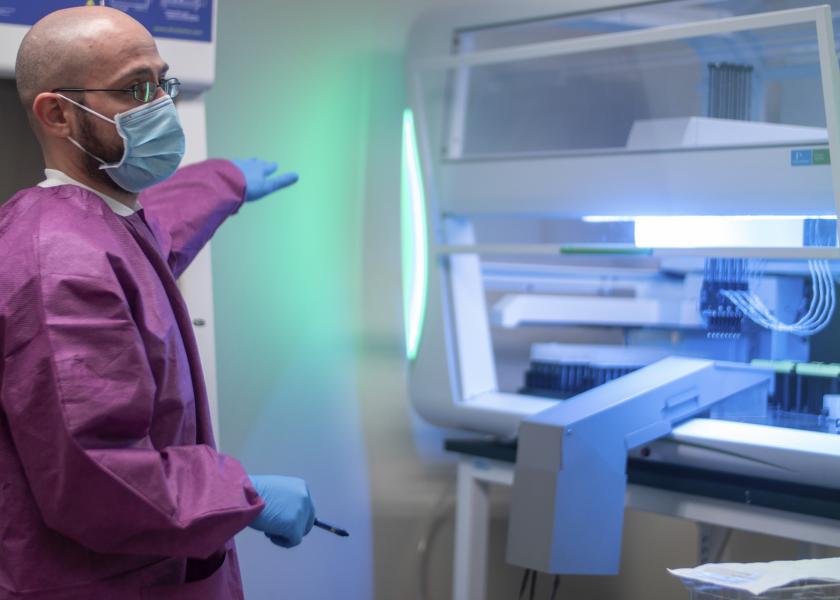Oklahoma Pandemic Center for Innovation and Excellence

A new public health and research center in Oklahoma is taking some of the best technology in the nation and using it to fuel a public health system that combines agricultural, environmental and human health for a holistic response.
Oklahoma Gov. Kevin Stitt, the Oklahoma State Department of Health and state Cabinet secretaries recently unveiled the new Oklahoma Pandemic Center for Innovation and Excellence (OPCIE) and the newly relocated Public Health Lab with a ribbon cutting ceremony in Stillwater.
“This is a new beginning for science and innovation in Oklahoma,” said Gov. Kevin Stitt. “The OPCIE is an incredible investment in public health that puts Oklahoma on track to becoming a Top Ten state, a national and global leader in pandemic preparedness and response and will attract top talent in clinical research, innovative grants and national investment in our great state.”
The OPCIE is the first public health and research center of its kind in the nation. The center’s mission is to develop innovative testing tools, conduct cutting edge research and grow partnerships between public and private entities, bridging the gap between laboratory and clinical practices and improving public health responses by establishing an all-encompassing approach to research for rural, urban and tribal communities.
OPCIE’s comprehensive approach to public health is based on the One Health concept – that the health of humans, animals and the environment are interrelated and interconnected. The goal of OPCIE is to prevent health threats at the human, animal and environmental level including zoonotic diseases, food safety and security, vector-borne diseases and environmental contamination.
Insights from animal health research and testing will enable the center to detect potential pandemics before they start. Zoonotic diseases are diseases which can be transferred from animals to humans (for example, H1N1, also commonly referred to as swine flu). Study of these diseases in animals allows us to get out in front of future threats to humans. OPCIE’s animal disease and diagnostic lab is closely tied to its human health lab, allowing for new levels of collaboration in surveillance and research.
The center will also work closely with Oklahoma’s agricultural sector to monitor crop health, preventing outbreaks that could originate in our food supply.
“Establishing this center in Stillwater in conjunction with the Public Health Lab allows for an unprecedented level of collaboration and knowledge sharing,” said State Commissioner of Health Dr. Lance Frye. “We can improve our public health practices and develop new knowledge when we work together across multiple sectors and pull in insights from different fields of science. With state-of-the-art technology and infrastructure, this facility positions Oklahoma to lead research and develop innovative capabilities to address new national and global public health crises.”
Through OPCIE, Oklahoma is in a unique position as a rural, agricultural and centrally-located state to become a global leader in leveraging human, animal and environmental science insights to improve public health through collaborative research and innovation.
The OPCIE was established in Stillwater and houses the relocated and modernized Public Health Lab. It will allow for all resources to be located in one place to collaborate on the highest caliber public health response.
“The agricultural industry in Oklahoma has long advocated for a One Health approach to public health,” said Sec. of Agriculture Blayne Arthur. “Scientific discoveries taking place in animal health have direct implications on human health and vice versa. The establishment of OPCIE is welcome news for our ranchers and farmers who understand the importance of food safety and security to maintaining human health.”
“OPCIE broadens and elevates the purpose of the Public Health Lab. This center will position Oklahoma to be at the forefront of studying and addressing pandemics as a public health issue for our state, nation and world,” said Sec. of Science and Innovation Elizabeth Pollard. “COVID-19 has brought to light the urgency for our state to have our own capability to respond to the public health needs of Oklahomans. The OPCIE is meant to become a national leading authority on all aspects of public health to ensure the needs of Oklahomans are addressed without dependence on other states or federal agencies in the midst of an emergency.”
The ribbon cutting marks a new beginning for science and innovation that will ultimately safeguard the health of Oklahomans, protect the vitality of the state’s agricultural industry and generate innovative research that can be leveraged on a national scale.
For more information on the OPCIE, visit http://oklahoma.gov/OPCIE.







